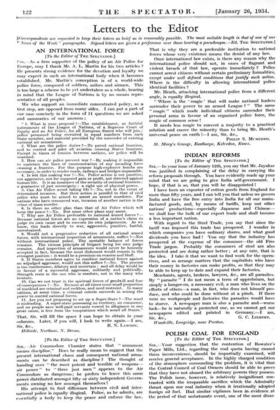INDIAN REFORMS
[To the Editor of INIE SPECTATOR.]
SIR,—In your issue of January 12th, you say that Mr. Jayakar was justified in complaining of the delay in carrying the reform proposals through. You have evidently made up your mind that we are going to give India self-government. I hope, if that is so, that you will be disappointed !
I have been an exporter of cotton goods from England for more than fifty years, and I can tell you that unless we govern India and have the free entry into India for all our manu- factured goods, and, by means of tariffs, keep 'out other nations' productions—especially Japanese and Chinese— we shall lose the bulk of our export trade and shall become a less important nation.
With regard to the Steel Trade, you say that since the tariff was imposed this trade has prospered. I wonder in which companies you have ordinary shares, and what good dividends you have had -You say that the industry has prospered at the expense of the consumer—the Old Free Trade jargon. Probably the consumers of steel are also protected and are doing rather better ; at any rate, that is the idea. I take it that we want to find work for the opera- tives, and so arrange matters that the capitalists who have their money in factories can make profits, so that they may be able to keep up to date and expand their factories.
Merchants, agents, brokers, lawyers, &c., are all parasites. By " parasite " I do not mean a term of opprobrium, but simply a hanger-on, a necessary evil, a man who lives on the efforts of others—a man, in fact, who does not himself pro- duce, and who could be done without at a pinch. If there were no workpeople and factories the parasites would have to starve. A newspaper man is also a parasite and—worse luck—he is naturally a protected one, as we cannot get our newspapers edited and printed in Germany.—I am,
Sir, &c., G. C. LIEBERT. Woodville, Longridge, near Preston.










































 Previous page
Previous page